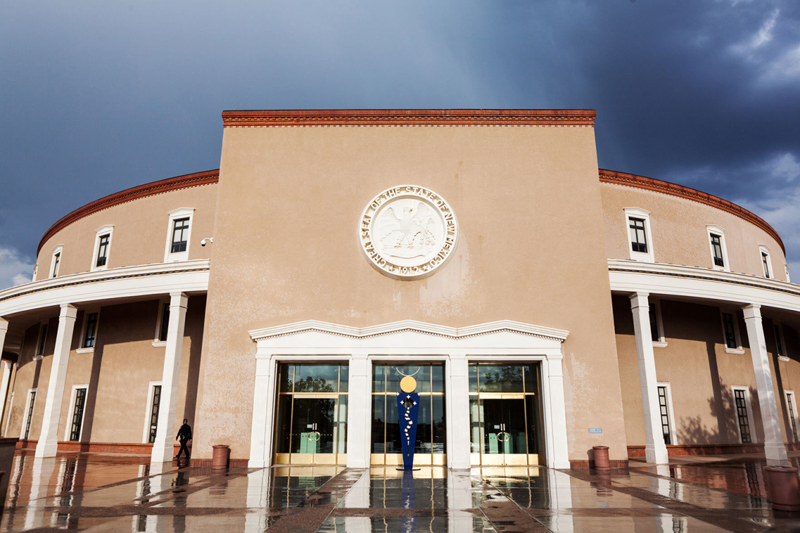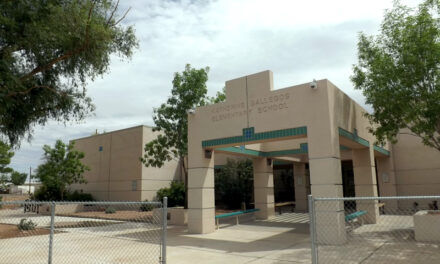Whether it’s a 60-day legislative session like this year, or a 30-day session, the state budget is always at the top of the priority list for lawmakers.
This year, many of Valencia County’s senators and representatives want to see a sharp focus on education and small business assistance.
Gov. Michelle Lujan Grisham will be asking legislators to approve $7.3 billion in recurring spending with a 3.3 percent increase.
“Amid great adversity, I recommend a fiscally responsible budget while maintaining essential funding for our public education moonshot, for the innovative economic diversification and opportunity New Mexicans expect, for the community, public safety and much more,” said Lujan Grisham. “The pandemic and economic uncertainty may have disrupted our forward momentum in job creation, child wellbeing improvements and various other policy emphasis areas, but we are ready to bounce back quickly and robustly. This budget recommendation is our first step to position New Mexico to prosper in a post-pandemic world.”
Some of the governor’s recommendations include:
• $475M for additional pandemic relief for New Mexico.
• $893.1 million in total fund money for behavioral health support across all state agencies
• $193 million for the continued rollout of early childhood education and care investments
• $151.2 million to maintain K-5 Plus, Extended Learning Time (ELTP) & Career Technical Education and Community School Programs
• $25 million to restore and revitalize the tourism economy
• $10 million from the general fund for broadband expansion across New Mexico, which should be bolstered by significant funding from capital outlay
Sen. Greg Baca (R-District 29) said the priority is getting businesses hit by the COVID -19 pandemic back on their feet so the state can retain its tax base.

Sen. Gregory A. Baca (R-District 29)
“There will be some relief to businesses and some essential workers who were left out. I’m sure you’ve heard, anecdotally, about people who were getting stimulus and unemployment making more than they would to go to work while other workers who were deemed essential and continued to work still ended up taking a financial hit,” Baca said.
The senator, who is the Senate minority leader, and sits on the Senate judiciary and rules standing committees, said he expects to see a bill that will eliminate some of the penalties from the citations issued for violations of the governor’s public health order.
“We are waiting right now on the feds to see what they are going to do. I don’t know if they are issuing more funding; they are talking about it,” he said. “These are needed programs. A lot of people got hurt in all this. At the end of the day, our focus is more on getting people back to work.”
Baca said the amount of expenditures being made by the state right now isn’t sustainable.
“We have hundreds of millions of dollars in federal money so the budget doesn’t look horrible but that won’t be sustained next year,” he said. “We need to get back to a normal footing and be self supportive once the federal money is pulled back.”
The proposed $7.36 billion budget for the 2021-22 fiscal year is almost the same as last year, and includes assistance from federal funding in addition to support from the state’s reserves.
“That’s not the permanent fund,” Baca clarified. “This is our reserves and this is what they are intended for.”
The budget does include increased spending, which Baca opposed based on the current scenario, he said.
“Next year might be a harder year. I hope they don’t bring in more recurring spending. I hope they cut back some so we have a cushion,” the senator said.
Sen. Liz Stefanics (D-District 39) said she believes there are a few items in the governor’s proposed budget the executive office and the Legislature should negotiate on.
“Our interest is raising some of the salaries for public employees and school employees …,” Stefanics said. “The amounts of money aren’t as far off but I think we need to combine some of our interest together.”
The senator, who is starting her third term in office, said the novel coronavirus relief and the economy should be the priority for this legislative session.
“The virus and the economy should be the first thing,” Stefanics said. “The economy — meaning all of our restaurants, our businesses that have been put on hold. We need some kind of relief.”
Stefanics said the Legislature has provided business grants and some unemployment benefits during the special session, along with money for mortgage and food banks, but the funds quickly ran out.
“We need to step up and do more,” said Stefanics, who did say the state does have money in nonrecurring funds that could be used for one-time grants and assistance.”
Rep. Kelly Fajardo (R-District 7) admitted earlier this month she hadn’t had a chance to fully delve into the governor’s proposed budget yet, but said she’s always concerned with the state’s spending.
“We’re really relying heavily on the federal government once again, and going after the oil and gas industry,” she said.
She does believe the state should help small businesses during the COVID-19 pandemic.
“People are just asking us to allow them to open,” Fajardo said. “So many people have asked me what they can do to stay open or just open. All I can tell them is that it’s the governor’s decision.”
As a small business owner herself, Fajardo understands what they are going through.
“I have a small family business, and I relied on the PPE loans myself,” she said. “If I didn’t have those loans, I would have had to shut down. I know exactly what these small businesses are going through.”
Sen. Joshua A. Sanchez (R-District 30), who is serving his first term, said he too hadn’t reviewed the governor’s budget yet, but wanted to see vocational training and education, as well as broadband infrastructure in rural areas as top priorities.
“I’d like to see us really push towards vocational training. I know education is always a bit part of the budget and I want to see that continue,” Sanchez said. “With the pandemic, it’s brought to the forefront that we really need to look at broadband infrastructure for our rural areas. If our kids aren’t in school, they’re falling behind. With connection problems, families get frustrated and say ‘to heck with it.’”
Rep. Matthew McQueen (D-Distirct 50) said while the budgets proposed by the executive and legislative branches were similar, the legislative proposal includes a modest raise for state workers.
While he’s only reviewed the education portion of the proposed executive budget, Rep. Alonzo Baldonado (R-District 8) said the $7.3 billion budget was more appropriate that the original $7.7 billion, but it was still a bigger budget than the state should be spending.
“In terms of education, the budgets were almost identical in bottom-line spending,” Baldonado said. “A lot of things can be done with specific spending instead of just spending a lot more.”
Rep. Gail Armstrong (R-District 39) said although the proposed budget lines up with what she expected the $9 billion the state has received in CARES Act funding has given the state a false sense of security.
“It feels like we’re in good shape but job creators are closing down. They’re borrowed a lot from the feds and that is a high concern for me,” Armstrong said.
She said it’s important to hold school districts “harmless” this year, because each district was operating differently. The bulk of public school funding comes from the state and current funding levels are based on factors such as the previous year’s attendance and bus ridership. With many schools in remote learning, ridership is close to zero and attendance has dropped across the state, so districts are asking legislators to not penalize them when they allocate funds for the next school year.
“The federal government is trying to give them more money, so we are focusing on that and making sure education is fully funded while holding districts accountable,” she said. “The goalpost in education keeps moving as (the state public education department) says one thing and the governor overrules them.”
Armstrong said her No. 1 priority for the session is opening up the state economy in a way that is respectful to the COVID-19 virus.
“We cannot keep watching businesses fail. We have to reopen schools and businesses,” she said.
With a third small business relief package in the works, McQueen said the state needs to simplify the process to make it easier to apply, and adjust the eligibility requirements to make it more accessible to New Mexico businesses.
The most important thing the Legislature can do for businesses is reopen the economy and get people back to work, Baldonado said, adding the red-yellow-green system is very restrictive.
In terms of relief funding, he favored the second round funding which was structured as grants.
“It doesn’t seem to me like a lot of people wanted to get more in debt with loans. What we did with that money in the second session was take the CARES Act dollars and distribute it to smaller businesses,” he said.
“The last year or so has been completely uncharted. It’s amazing to see how many businesses have been able to stay afloat and carry on.”
(Editor’s Note: Read next week’s News-Bulletin for additional coverage of the 2021 legislative session.)
The Valencia County News-Bulletin is a locally owned and operated community newspaper, dedicated to serving Valencia County since 1910 through the highest journalistic and professional business standards. The VCNB is published weekly on Thursdays, including holidays both in print and online.


















